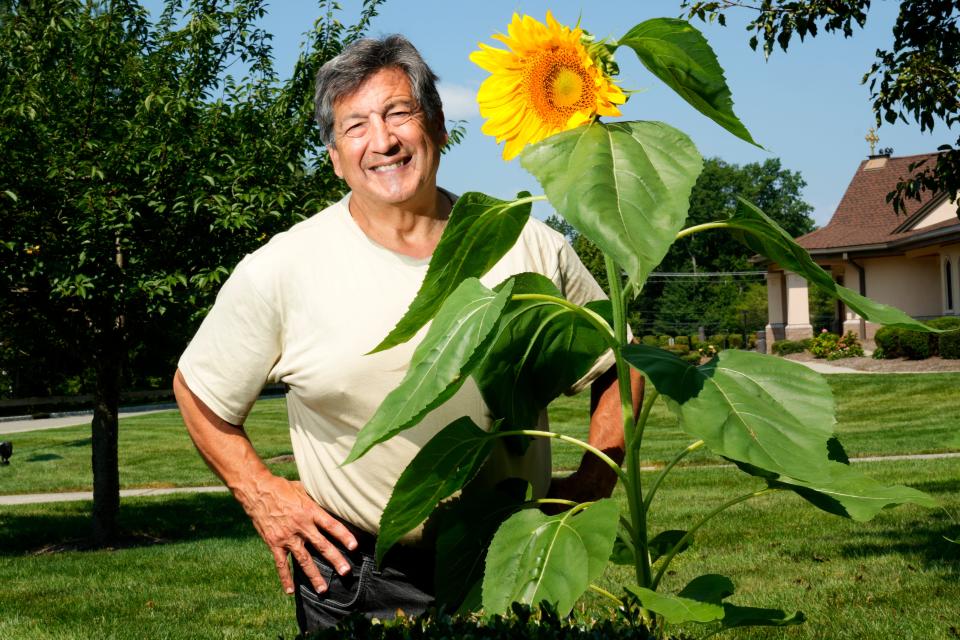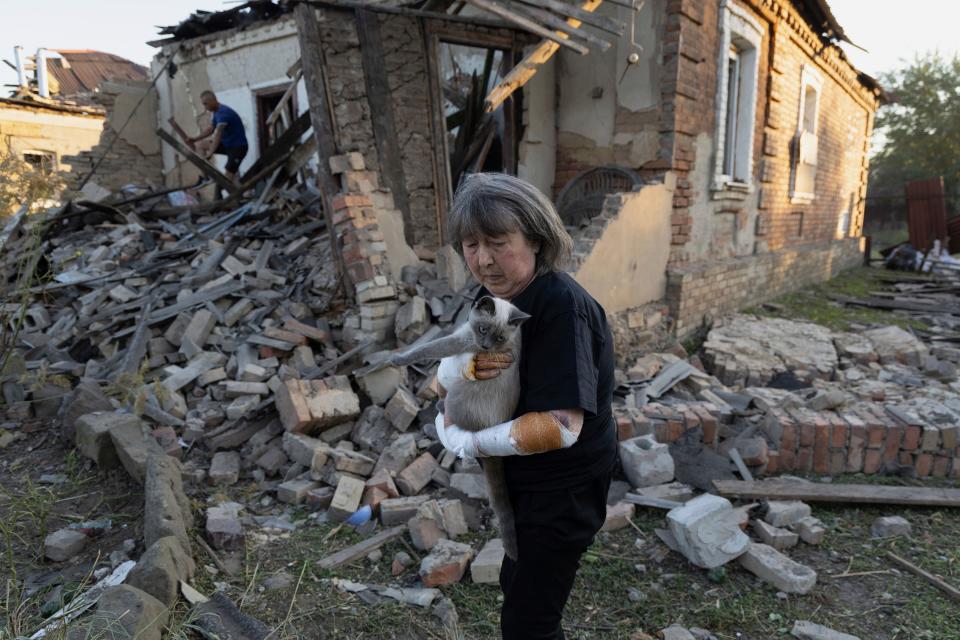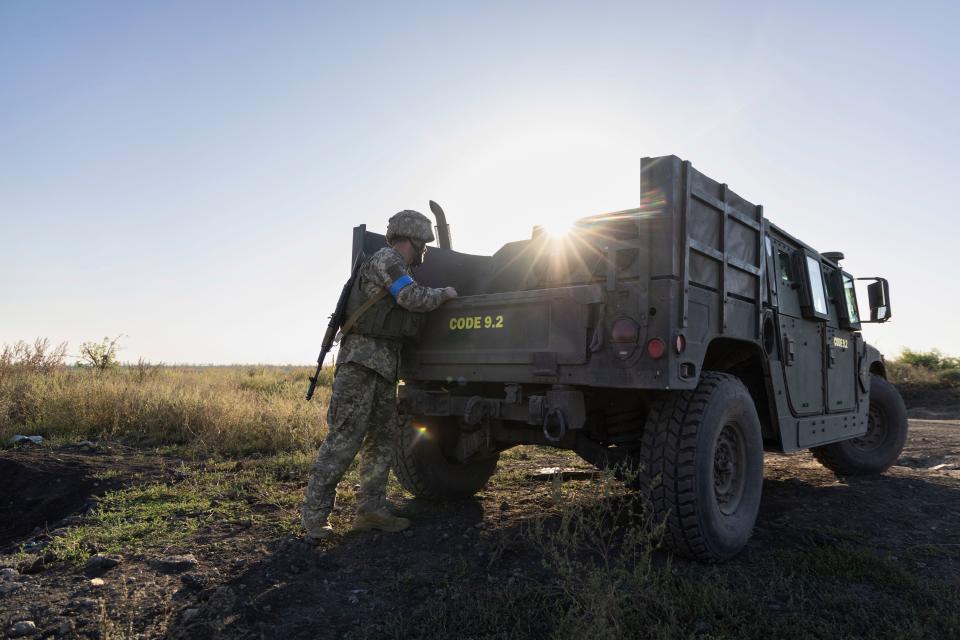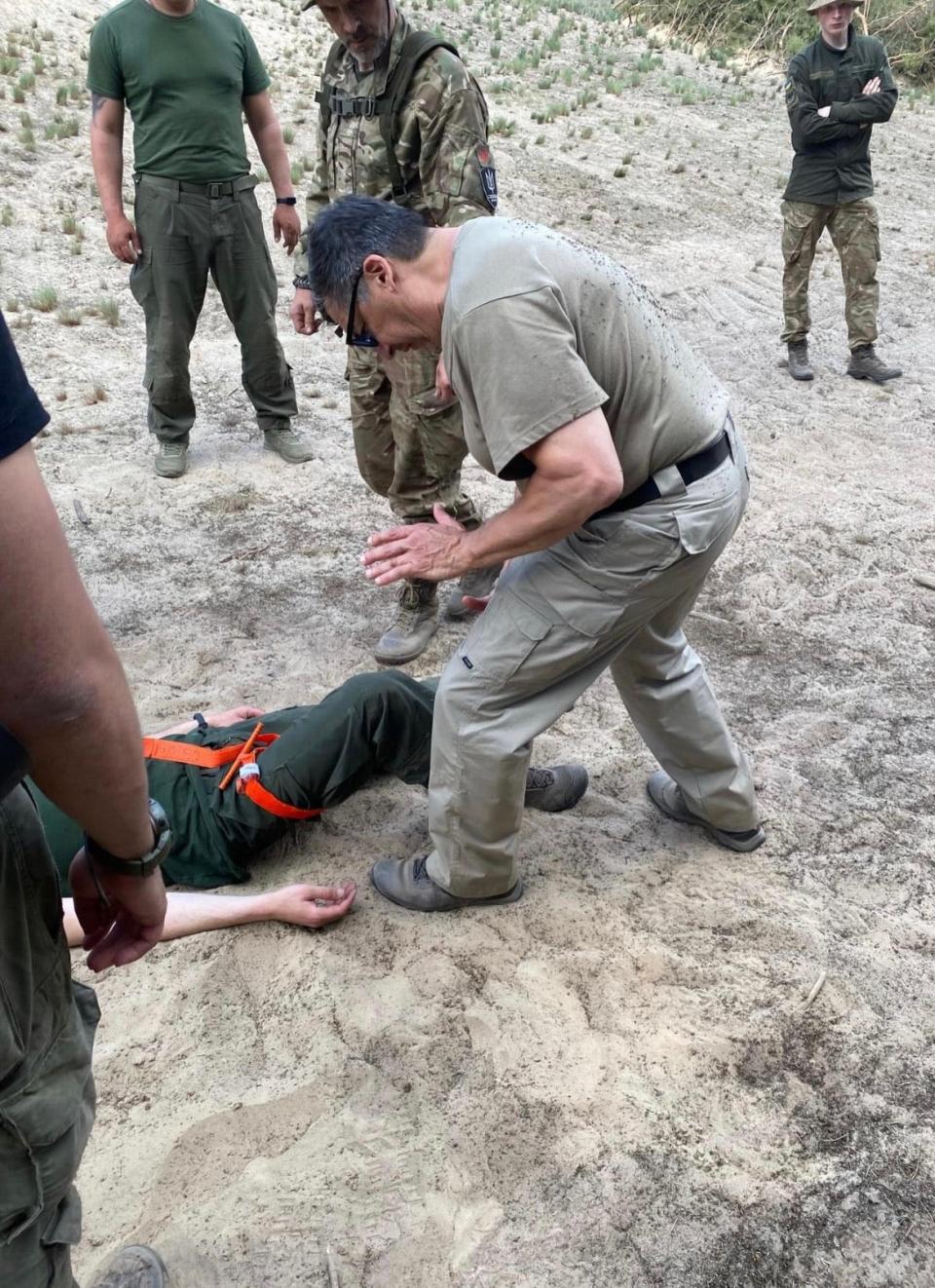Mountain Lakes man saves lives in Ukraine, fundraises for medical supplies
- Oops!Something went wrong.Please try again later.
Car bombs reverberating. Dogs barking incessantly. A drone exploding in the air right above him.
Mark Di Ionno knows danger.
Over the past two years, it has become commonplace for Di Ionno, a Morris County resident who spent a combined six months in war-torn Ukraine.
He drove along the Dnipro River to deliver supplies with the Russian army stationed across the riverbank, their jets flying directly overhead. While on a supply trip in Kyiv, he heard those car bombs and dogs barking — constant, harrowing reminders of the ongoing destruction.
He braved all of this, he says, out of a deep respect for the Ukrainian people and the recognition that he could help their cause.
“I really just fiercely admire these people. I really do and that is why I kept going back. They deserve all the support that they can get,” said Di Ionno, a Navy veteran, author and former Star-Ledger columnist who lives in Mountain Lakes. “The people that are fighting for their freedom are the most amazing people in the world. They really are. And it’s a beautiful country. The Russians aren’t just fighting an army, they’re fighting an entire country.”
He has raised $30,000 for relief efforts in Ukraine. But he has gone far beyond the aid that many Americans have provided. Across his six trips to the war-torn country, he's transported refugees, aided supply distribution for relief efforts and administered field medicine training to Ukrainian soldiers, among many other endeavors.
His travels to Ukraine involved multiple forms of humanitarian work

Di Ionno, a Pulitzer Prize finalist, says his interest in humanitarian work in Ukraine stemmed from his experiences as a veteran. He served as a navy hospital corpsman from 1975 to 1979 at Philadelphia Regional Naval Medical Center. The hospital was the amputee center for the entire East Coast and mainly treated soldiers injured in Vietnam at the time.
Disappointed with the U.S. response to the invasion in Ukraine, Di Ionno jumped on a plane to Warsaw on March 3, 2022, a week after the war began, without a plan. Though he originally tried to join a volunteer combat force of American military veterans, he was denied entry because, at 66 years old, he was a liability in combat.
While U.S. support for Ukraine has expanded, Di Ionno said that the country is not giving Ukraine the proper equipment, including the jets, missiles and naval support he says could help them effectively fight the war.
“We have the military power. And Russia understands that we have the military power,” Di Ionno said. “We could have dissuaded them from invading a free, sovereign, democratic nation, which was always the red line during the cold war.”
Dangerous journeys, tireless work
While staying in Dorohusk, a town on the Ukrainian-Polish border, he joined the Catholic international volunteer group Caritas. There, he transported refugees to train stations, private homes and relatives across Ukraine and other countries, going as far as Berlin with one family.
These journeys in his rental Opel Astra Station wagon could last up to 12 hours, during which he used a translation app to speak with the refugees. Most were women, children and the elderly, who left behind their homes, careers and family to escape bombings.
Their plight was urgent, and most had traveled for hours already to get to the border. Di Ionno drove them straight to where they needed to go without stopping to rest. On his way back to Dorohusk, he’d nap at rest stops and occasionally slept in short-stay single rooms at Orlen, a Polish gas station chain.

Di Ionno, alongside the Ukrainian American Cultural Center of New Jersey, later began fundraising and delivering medical supplies across Ukraine, including tourniquets and first aid kits. He delivered these and other important supplies, like military vehicles, to various cities, including Kyiv and Poltava, which were actively being bombed.
Many of the wartime deaths in Ukraine have occurred due to people bleeding out; as such, their limited medical supplies are incredibly crucial.
With David Brymer, who is from Southern Illinois, Di Ionno trained soldiers in field medicine, giving them an advantage over the Russians and saving lives in the process. His time in the military paid off — he taught soldiers proper tourniquet and bandaging techniques that he learned as a navy hospital corpsman.
'Humongous' impact on Ukraine
The impact of Mark’s work and the UACCNJ’s donations has been “humongous,” said Khrystyna Sloan, a volunteer for the UACCNJ.
Sloan mentioned that after a member of the UACCNJ did a Facebook live of a fundraiser they held for Ukraine, they received an outpouring of supportive messages from Ukrainians about the impact of the organization’s efforts.
“We received so many text messages, phone calls, and the comments on it, that the people were losing hope in Ukraine,” Sloan said. “But when they see that in the world, somebody is thinking of them, and doing something … it’s bringing them back to life that they’re not alone, that they know that the people stand behind them and everybody is doing as much as they can.”
She added, “People think that the war in Ukraine is over. But it’s not. It keeps getting more aggressive and dangerous.”
Resilience of Ukrainian citizens, especially women, is the backbone of the war
While Di Ionno was in Ukraine, he witnessed tragedy — the total destruction of village after village.
The strength and unity of the Ukrainian people in facing the war made a deep impression on him. They lost so much – loved ones, homes, jobs – to non-strategic bombings and attacks that qualified as vandalism, Di Ionno said. Despite this, everywhere he looked, they were organizing relief efforts to support their local communities and the military. One woman he knew lost her job because of the war and began a refugee center for women and children, while others worked full-time jobs and put in nearly identical hours for relief and military efforts.

Di Ionno was present for the fighting and bombings of Antonov Airport, which left much of the airport and the surrounding area destroyed. After the fighting had passed, he reported that the first structure rebuilt by the Ukrainians was a local children’s playground.
“To me, that was such a statement of both hope and defiance,” Di Ionno said. “We’re going to be here. We’re going to have a future and you’re not going to stop that.”
The deep involvement of Ukrainian citizens in the fight for their country struck him as something that would likely not occur in the U.S. today.
“I think the political polarization has destroyed our national unity,” Di Ionno said, citing the pandemic as an example of our failure to “unify over an emergency.”
While in Ukraine, Di Ionno learned that extraordinary efforts from women are helping the country stay afloat. Women are joining the military for active duty, and civilian women have gone above and beyond to support their country while excelling at full-time jobs and in some cases taking care of relatives.
Di Ionno noted that everywhere he goes, women are at work. They're collecting for the military, putting together medical aid boxes and accomplishing incredibly tedious work like making camouflages. They’re supporting their neighbors and communities despite facing devastation in their own lives from the war.
Vita Datsenko is one such woman. She spent nearly as many hours at the aid depot as her full-time job as an ophthalmologist. She helped organize the intake and distribution of donations, including emergency food, clothing and medical supplies for civilians in bombed areas and uniforms, gear and first aid kits for the military.
Liudmila Rudenko is another extraordinary woman. A teacher who owns a café in Irpin, she has continually managed to feed her neighbors who lost everything in Russia’s destruction of Bucha, Irpin and Hostomel, despite her café being bombed. She took online courses from a university in Milan to counsel children in her city, who have been traumatized by seeing their homes destroyed.
Support from outside Ukraine is crucial
Outside of Ukraine, people at the UACCNJ have also been collecting goods in support of the war. Roksolana Vaskul, an anesthesiologist, has helped the organization send over 18 shipping containers of goods to Ukraine valued at over $4,000,000, made medical visits and financed ambulances and vehicles for the army alongside the cultural center.
Every donation counts. A generous person donated a school bus, which the UACCNJ transformed into an ambulance and shipped to Ukraine last month, Sloan said.
The UACCNJ is currently accepting donations to send to Ukraine, including money, medical supplies and military items, on their website. Sloan organized a fundraiser to build a playground for over 83 refugee children with developmental disabilities. They are living in a school that has been repurposed as an orphanage in Lviv, a Ukrainian city near the Polish border. $30,000 of the $40,000 needed has been raised already.
“No matter what is happening in those kids’ lives, what do you think they're going to do on the playground?” Sloan said. “They're going to have fun. … For years, it's going to stand there and bring happiness.”
“I am proud to live in the United States because the people are incredible here,” Sloan added.
She gave the example of the seven-year-old son of her friend, who was inspired to help the cause after seeing the many boxes of supplies the UACCNJ was preparing to donate.
He gave Ukrainian flags to his neighbors to place outside their houses and told his family and friends that he would be placing a shoebox outside his house for donations to the UACCNJ. Despite his young age, he garnered about $2,500 for Ukraine from his efforts, demonstrating that anyone can make an impact.

To donate
Donations can be made to this cause through the UACCNJ website, their venmo, or by check mailed to the UACCNJ. It's important to include in the memo of donations that it is for the playground in Lviv, Sloan said. For more information, people can email Sloan at KhrystynaSloan@gmail.com.
This article originally appeared on NorthJersey.com: Mountain Lakes NJ: Mark Di Ionno provides aid in Ukraine

